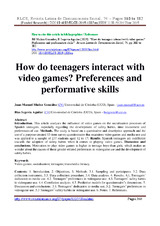Mostrar el registro sencillo del ítem
How do teenagers interact with video games? Preferences and performative skills
| dc.contributor.author | Muñoz González, Juan Manuel | |
| dc.contributor.author | Segovia Aguilar, Blas | |
| dc.date.accessioned | 2019-05-28T09:41:42Z | |
| dc.date.available | 2019-05-28T09:41:42Z | |
| dc.date.issued | 2019 | |
| dc.identifier.uri | http://hdl.handle.net/10396/18666 | |
| dc.description.abstract | Introduction. This article analyses the influence of video games on the socialisation processes of Spanish teenagers, especially regarding the development of safety habits, time investment and preferences of use. Methods. The study is based on a quantitative and descriptive approach and the use of a purpose-created 13-item survey questionnaire that examines video games and media use and was applied to a sample of 237 students aged 12 to 17. Results. Spanish teenagers are indifferent towards the adoption of safety habits when it comes to playing video games. Discussion and conclusions. Motivation to play video games is higher in teenage boys than girls, which makes us wonder about the causes of these gender-related preferences in videogame use and the development of safety habits. | es_ES |
| dc.format.mimetype | application/pdf | es_ES |
| dc.language.iso | eng | es_ES |
| dc.publisher | Universidad de la Laguna | es_ES |
| dc.rights | https://creativecommons.org/licenses/by-nc-nd/4.0/ | es_ES |
| dc.source | Revista Latina de Comunicación Social, 74, 360-382 (2019) | es_ES |
| dc.subject | Video games | es_ES |
| dc.subject | Socialisation | es_ES |
| dc.subject | Teenagers | es_ES |
| dc.subject | Transmedia literacy | es_ES |
| dc.title | How do teenagers interact with video games? Preferences and performative skills | es_ES |
| dc.type | info:eu-repo/semantics/article | es_ES |
| dc.relation.publisherversion | http://dx.doi.org/10.4185/RLCS-2019-1335-18en | es_ES |
| dc.relation.projectID | Gobierno de España. CSO2014-56250-R | es_ES |
| dc.rights.accessRights | info:eu-repo/semantics/openAccess | es_ES |

